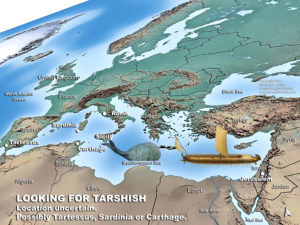I JUST FINISHED MAPPING Jonah’s story for the new paraphrase of Jonah in the Casual English Bible.
It’s an interesting story that many Christians read as history, especially since Jonah shows up elsewhere in the Bible. But some Christians and Christian scholars as well say they read the story as fiction, but with a real person playing an imaginary role. They say they see in the story many characteristics of the kind of parables Jesus told.
I don’t think most Christians read it that way. So let me give a few reasons Christians on the fiction side of the argument say it reads like a parable.
Argument for Jonah as fiction-parable
It’s short and action-packed. It’s a bit longer than the parables Jesus told, but not that much longer than the parable of the prodigal son, which is pretty much what Jonah was for a while.
It puts Jonah in a fish’s belly for three days. Science takes a bite out of that account of the facts. Common sense wants a bite, too.
Animals wear sackcloth. All the people in Nineveh and the livestock are to wear sackcloth mourning clothes and repent of their sins so God doesn’t destroy the city. It feels like an exaggeration to help emphasize an idea. It’s hard enough to see sweaters on dogs. But sackcloth on a bull rings like fiction to some Christians.
Jonah converts a pagan nation. Israel’s prophets couldn’t even convert the Israelites.
Jonah gets crazy livid with God for sparing the converted nation. He had told the Assyrians that Nineveh had 40 days to doomsday. Didn’t happen. Jonah told God to kill him now.
Oddest ending of a Bible book. Jonah is sitting by a shade bush that just died in a day, still pouting about God’s compassion. God tells him, “You cared about a bush even though you didn’t plant it or water it. That bush was here one day and gone the next. But it’s not okay for me to care about this huge city of Nineveh? There are more than 120,000 people here” (Jonah 4:10). That’s the kind of zinger Jesus liked to end with when he told a parable.
Many, perhaps most, read it as history
I’m not trying to convert anyone, or talk them into throwing Jonah out with the baby. But there are different ways to find truth in the Bible.
If this is a parable, the lesson seems to be that God cares about everyone, not just the Chosen Nation of Israel. That lesson adds fuel to Paul’s argument: “If you’re one of the Messiah’s people, then you’re a descendant of Abraham. You’re part of the family. And you’re going to inherit what God promised,” (Galatians 3:29).
If Jonah is history, add the lesson that God does miracles and bulls can wear clothes.
Actually, both of those are probably true even if Jonah’s story is a parable.
It’s a really short story. You can read it in about 10 minutes. Give it a read if you can spare a dime.
Jonah was here
Casual English Bible
Steve’s Bible Bible-background YouTube Channel
More feature articles
Bible Gateway



I believe Jonah’s story to be true. Why? It’s no more extraordinary than the other accounts of God doing amazing miracles, parting the Red Sea, Extending the day, etc. Not only that. In 2 Kings , we find that Jonah was an actual prophet living during the time of Jeroboam 2. Lastly because Jesus testified of Jonas in Matthew . He confirmed the repentance of Nineveh not as a parable but as an actual city that repented at the preaching of Jonas. It the account so outlandish that God would be incapable to perform it? No, it falls in line with the entire Bible.
Hi, Dana. You could be right about Jonah being a work of nonfiction. But I think many serious biblical scholars would say your case is not a strong one. Jesus mentioned the “sign of Jonah,” which most scholars seem to interpret as a reference to 3 days in the belly of the fish…a foreshadowing of Jesus buried for 3 days (actually for just parts of 3 days). Jesus’s reference doesn’t necessarily validate the history of the Book of Jonah. Nor does the mention of the prophet himself, elsewhere in the Old Testament. But the Bible presents God as a can-do diety. Yet a pertinent question might be, Would God the Father, represented to us as the Son, put anyone in the belly of a large fish for 3 days? On the flip side, he did put me in Kansas.
I got to this site googling Nineveh. I happen to believe every word of the Bible is true. While reading Mr. Millers comment something stood out, “Jesus buried for 3 days (actually for just parts of 3 days)”. This strikes me as an attempt to minimize that our Savior was physically dead for 3 days. What else in the Bible do you feel is just to difficult to explain or prove with science? Did God really speak the universe into existence? Proverbs 3:5 Trust in the Lord with all thine heart; and lean not unto thine own understanding.
I don’t want to be disrespectful with my disagreement, this is my opinion. The majority of Christian based churches today seem to be more focused on raising money and figuring out how to explain the Bible so that it matches up with the ever changing science books and findings yet the Bible has remained unchanged other than the copyrighted versions that appeal to a watered-down feel good bunch that should be called social clubs and not churches. We need a revival throughout the world that recognizes that God as the creator of all. He has provided us with the written Word yet we choose to only accept what makes sense to us.
As for “serious biblical scholars”, It is better to trust in the Lord than to put confidence in man.
I agree with Dana.
The same way the word of the Lord came to other real human being prophets like Jeremiah and Ezekiel, the word of the Lord came to Jonah, the servant and prophet of God.
Jonah 1:1-2 – 1 Now the word of the Lord came to Jonah the son of Amittai, saying, 2 “Arise, go to Nineveh, that great city, and cry out against it; for their wickedness has come up before Me.”
Jeremiah 1:1-2 – 1 The words of Jeremiah the son of Hilkiah, of the priests who were in Anathoth in the land of Benjamin, 2 to whom the word of the Lord came in the days of Josiah the son of Amon, king of Judah, in the thirteenth year of his reign
Ezekiel 1:3 – 3 the word of the Lord came expressly to Ezekiel the priest, the son of Buzi, in the land of the [b]Chaldeans by the River Chebar; and the hand of the Lord was upon him there.
2 Kings 14:25 – He (king Jeroboam II) restored the territory of Israel from the entrance of Hamath to the Sea of the Arabah, according to the word of the LORD God of Israel, which He had spoken through His servant Jonah the son of Amittai, the prophet who was from Gath Hepher.
This is a real person, same Jonah, son of Amittai mentioned in the Jonah 1:1.
Matthew 12:39-41 – 39 But He answered and said to them, “An evil and adulterous generation seeks after a sign, and no sign will be given to it except the sign of the prophet Jonah. 40 For as Jonah was three days and three nights in the belly of the great fish, so will the Son of Man be three days and three nights in the heart of the earth. 41 The men of Nineveh will rise up in the judgment with this generation and condemn it, because they repented at the preaching of Jonah; and indeed a greater than Jonah is here.
Jonah was real and the Lord Jesus Christ said Jonah preached to Nineveh. If that part is true, so is the rest.
In the Lord Jesus’ parables, He often said – a certain man, or a father, or a sower, etc. but here, He named Jonah and Nineveh, equating him to be the same Jonah in the book of Jonah.
The Lord Jesus’ reference to Jonah does indeed validate the history of the Book of Jonah, and the manner in which he spoke of Jonah and Nineveh, indeed validates that both existed on this earth, and these events did take place.
Jesus is Lord, He is God, and Numbers 23:19 says:
“God is not a man, that He should lie,
Nor a son of man, that He should repent.
Has He said, and will He not do?
Or has He spoken, and will He not make it good?
The mention of Jonah the prophet himself, elsewhere in the Old Testament, does also indeed validate the same.
2 Kings 14:25 mentions Jonah by name, his father’s name, and add his birth place, so he was a human being on this earth, who existed and God used him to not only speak for Him, but also bring repentance and salvation to many. In the process, He gave the people a sign of His burial in the grave. He knew the Pharisees believed Jonah was a true prophet of God who got swallowed by a big fish, therefore He used Jonah as an example. If they believed Jonah was in the belly of the fish, then they should believe Him, especially, that He died, was buried, on the 3rd day He rose from the dead (I think I understand what you meant with the parts, but yes, still considered 3 days – the Jews counted day 1 from any hour of that day, even if it was later in the day, they still considered it 1 day; please correct me if wrong); He ascended back up to Heaven, sat down on the right hand of the Father, and is coming back again.
All Dana said was excellent, loved it; strong case for the entire book of Jonah being non-fiction.
Bible scholars do sometimes disagree on certain scriptures.
Hi Mary.
Certainly Jonah shows up elsewhere in the Bible. I don’t have any reason to doubt he existed. But I’m not sure the story in Jonah history. My guess is that it’s something else and intended to teach us a lesson about God’s love for everyone, not just for the Jewish people. Jesus told shorter stories like this, which seemed to be fiction. We call them parables.